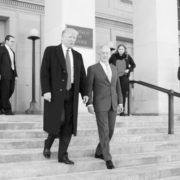Trump’s authority to ban travelers from certain nations will be examined, justices to rule on case by June
Amid the ongoing parlay in Washington over the nation’s immigration system, the Supreme Court announced on Friday, January 19 that it would consider reviewing a challenge to President Donald Trump’s latest version of his controversial travel ban.
Concerning the third and latest version of the travel ban, the case — Trump v. Hawaii — questions the legality of the ban and the president’s authority to implement it. In September, the plaintiffs argued that the ban was not justified by legitimate national security concerns and, rather, religious motives.
The Supreme Court’s decision also follows a series of rulings against the ban’s latest version from lower courts, including the State of Hawaii which has filed the suit along with immigrant rights groups.
In a brief requesting the Supreme Court to allow the lower courts’ decisions to stand, the plaintiffs — led by Hawaii Attorney General Douglas S. Chin — said, “No prior president has attempted to implement a policy that so baldly exceeds the statutory limits on the president’s power to exclude, or so nakedly violates Congress’s bar on nationality based discrimination in the issuance of immigrant visas.”
The justices will rule by June 2018 whether the ban is constitutional in what will be a significant evaluation of the president’s authority.
The announcement comes nearly a year after the first iteration of the travel ban was announced. The ban coincides with Trump’s long-awaited wish to limit travel from countries who have been deemed threats to the nation’s security.
The most updated version of the ban, among other things, restricts travel from citizens of Iran, Libya, Syria, Yemen, Somalia, Chad and North Korea; some people from Venezuela have also been barred from entering the U.S. The ban also would put a temporary ban of refugees from the affected countries.
Several federal judges have ruled against the ban, arguing that it violates the constitution by “discriminating” against certain nationalities.
“To the extent that the Government might have provided additional evidence to establish that national security is now the primary purpose for the ban, it has not done so,” U.S. District Judge Theodore D. Chuang of Hawaii wrote in October in a ruling blocking the ban.
In December, the Supreme Court allowed parts of the ban to go into effect as the case progressed. This move overturned a compromise set in June 2016 that allowed travelers from affected countries to come to the U.S. if they could prove a bona fide relationship with a U.S. citizen or entity. (Klarize Medenilla/AJPress)







